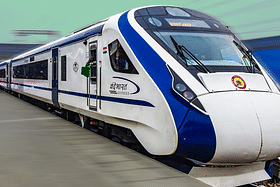Five major rolling stock companies including Alstom, Siemens, Medha and Russian TMH have qualified to participate in the financial bid for manufacturing 200 Vande Bharat trains.
The financial bid is expected to open on Wednesday (1 March) and the lowest bidder would be awarded the contract for making 120 Vande Bharat trains and the second lowest one would be given the order for manufacturing 80 trains.
While Alstom has entered the race alone, other four players have formed consortiums.
Medha has joined hands with Stadler, Bharat Heavy Electricals Limited (BHEL) with Titagarh Wagon, TMH (Russian company) with Rail Vikas Nigam Limited (RVNL), a railway PSU, and Siemens with BEML, to form consortiums for bidding of the Rs 46,000 crore project.
All had submitted the bids and the Railways had opened the two-packet bids on 30 November last year.
All are found to be qualified to participate in the financial bid for the Rs 46,000 crore project, after the technical evaluation by the tender committee, the Railways maintains.
It is estimated to cost Rs 130 crore for manufacturing a 16-coach Vande Bharat train with Sleeper facility. There is a provision for increasing the number of coaches to 20, if the demand grows for a particular section.
Since the selected bidders will be also given responsibility to maintain the semi-high speed trains for 35 years, it is expected to cost about Rs 20,000 crore.
Till now the Railways has awarded a contract for manufacturing of 102 Vande Bharat trains with seating arrangement. However, in the current project, the manufacturers are being given options to make Vande Bharat trains either with seating or sleeper facilities.
The design for sleeper is different from the existing Vande Bharat trains as there would be three toilets in each coach, instead of two now.
The water tank would be 2,000 litre capacity as against 1,880 litre, in the existing Vande Bharat train.
Berth pattern would be changed to make it sleeper class with arrangement for curtains, pantry cars and matching lighting system.
While the lowest one would be manufacturing 120 Vande Bharat trains, the second lowest would be producing 80 trains. It would take about 24 months to produce the first prototype after the award of the contract.


